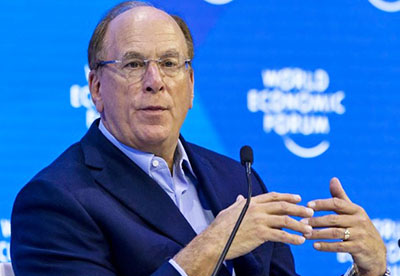by WorldTribune Staff, January 18, 2023
The CEO of the world’s largest asset manager is scrambling to keep the ESG bubble from bursting.
As backlash mounts over BlackRock’s enforcement of environmental, social, and governance (ESG) investment policies, CEO Larry Fink said in an interview at the World Economic Forum (WEF) in Davos, Swtizerland that “We are doing everything we can to change the narrative.”

U.S. states have pulled billions of dollars in public funds from BlackRock over accusations that ESG policies are “greenwashing” the fossil fuel industry and turbocharging America’s “woke” culture.
On Tuesday, Fink told Bloomberg TV that ESG investing has been tarnished: “Let’s be clear, the narrative is ugly, the narrative is creating this huge polarization.”
In December, Florida made the most significant withdrawal, pulling $2 billion from BlackRock.
“Using our cash to fund BlackRock’s social-engineering project isn’t something Florida ever signed up for. It’s got nothing to do with maximizing returns and is the opposite of what an asset manager is paid to do,” Jimmy Patronis, Florida’s chief financial officer, said in a recent statement.
Texas Lt. Gov Dan Patrick has urged state officials to label BlackRock as a hostile entity for its action in the attempt to crush the oil and gas industry.
BlackRock is “capriciously discriminating” against fossil fuel firms, Patrick said as he called for the asset manager to be added to the list of financial firms that “boycott” fossil fuels.
Tesla CEO Elon Musk called ESG a “scam” last year after his electric-vehicle company was excluded from an S&P Global ESG index.
In a tweet earlier this week, Musk said: “The S in ESG stands for Satanic.”
A former BlackRock senior executive, Terrence R. Keeley, recently opined in a Wall Street Journal article that after “trillions of dollars have poured into environmental, social and governance funds in recent years … there is astonishingly little evidence of its tangible benefit.”
James Lindsay, author of “Race Marxism” and other books challenging woke narratives, has taken ESG scores into his crosshairs, calling it a weapon in the hands of “social justice warriors” to shake down corporations and a tool in the hands of those seeking to impose “one world government.”
Fink said on Tuesday: “We are trying to address the misconceptions. It’s hard because it’s not business any more, they’re doing it in a personal way. And for the first time in my professional career, attacks are now personal. They’re trying to demonize the issues.”
West Virginia Treasurer Riley Moore “cemented his status as the unofficial ringleader of the anti-ESG movement” when West Virginia became the first state to cease business with major banking institutions like BlackRock, Wells Fargo and others because he deemed them hostile to fossil fuels, Ramsey Touchberry reported for The Washington Times last month.
“This pressure that we’re creating at the state level, I think it’s sometimes less about the totality of dollars that are moving. It’s also raising a massive amount of awareness in the public’s mind about what this problem really is. We have a fiduciary duty to do that,” Moore said.
Energy-rich West Virginia has since been followed by seven other Republican-led states that have taken similar action, cumulatively divesting nearly $4.3 billion in public funds from BlackRock alone last year, according to a Washington Times analysis.
“It may seem like a minuscule amount of money for a company with some $8 trillion assets under management, but BlackRock executives have increasingly pushed back as other investment corporations have begun to retreat,” Touchberry noted.
The states that pulled public money from BlackRock last year, most of which were state pension funds, include $2 billion from Florida, $794 million from Louisiana, $543 million from Arizona, $500 million from Missouri, $200 million from South Carolina, $125 million from Arkansas, $100 million from Utah and $20 million from West Virginia.
Action . . . . Intelligence . . . . Publish
